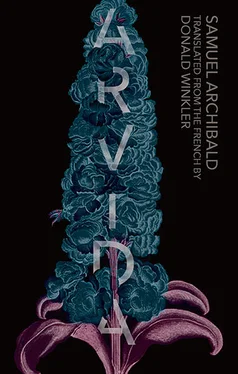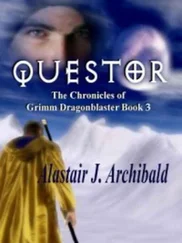For ten years he’d taken care of his sick mother as well as his clumsy fingers would allow. During all that time people had sympathy for him, then pity. When his mother died and his brothers and sisters decided to sell the house, Monsieur Blackburn had offered him, for a modest sum, the small apartment he’d fixed up in his basement. Raisin had accepted. The Blackburns let him entertain up to three guests on the front balcony, and when they left on vacation they let him swim in the pool. Raisin made modest use of these privileges. He rarely authorized the last-born to join him and preferred hanging out with them on the baseball field. He was more likely to invite his most troubled clients, those who were always looking for somewhere they could drink out of range of their wives. He also invited Martial, who was not married, often hung around the brasserie, and liked talking to Raisin, who enjoyed listening to him.
In the neighbourhood, you didn’t talk about “bikers,” about “gangsters,” or about “organized crime,” but about the “ gaffe .” Martial wasn’t a real member of the gaffe, but he’d hovered about it for a long time. He did little jobs for the guys in the gaffe, deliveries, driving, that kind of thing. From time to time they let him deal in small quantities of drugs, and in his free time he got involved in all sorts of schemes, and broke into houses to steal television sets or jewellery. He’d also done a bit of prison. He was small, scrawny, and nervous. He had blonde hair, long and greasy, little faded tattoos on each forearm, and joints that stuck out like broken bottles.
That’s probably how it all came about, in fact. Martial had spent his life imagining he was tough enough to order up a murder, and Raisin, who had tolerated ten years of pitying looks from all and sundry while he was taking care of his mother, would swill the aftertaste of pity out of his mouth by imagining that he was capable of killing someone. The two were made for each other.
In any case, one evening, while they were talking quietly on the steps of the Blackburns, Martial let slip:
“That asshole Sanguinet, I wish he were dead.”
Raisin replied:
“I could take care of that.”
There was silence. Martial began to perspire. He didn’t quite know what to say. His only thought was to ask:
“Would you do it for two thousand?”
And Raisin replied:
“Yes. Five hundred now and the rest after.”
They’d just taken a big step. A kind of moronic one, obviously, but a step all the same. Two normal people would have changed their minds, would have found a way to unsay what had been said while still saving face, but not them. Their whole relationship was a sham. Each one told himself, through the mediation of the other, that he was more dangerous than people thought, that he wasn’t just a petty crook and a simple soul. They could have gone on pretending to be tough. To have made believe that the conversation had never taken place, and to have kept on telling themselves that they were really the sort to talk that way. They could have, but, in truth, that would have made huge demands on their respective capacities for abstraction.
They parted with a handshake, and each went his way, stepping briskly, to the rhythm of two hearts beating wildly in their rib cages.
Raisin had pondered the question for a long time. His father had owned a small.22 calibre long gun for years, never registered. It was in a closet in the basement, stored in its case along with an old box of bullets. When his mother died, Raisin was able to hide the rifle and save it from being sold off. No one in the family, or outside it, knew about its existence. He could easily kill someone with it and go somewhere to bury it. What was crucial, and this he’d learned from cop films, was never to be caught with the gun.
And so Sanguinet was going to die, because he’d refused to let Martial, after the deadline, change his bet on a football match, he who insisted in betting on sports even if he knew nothing about them, and kept on asking Sanguinet to alter his bets even though he knew the bookmaker couldn’t do so.
Sanguinet was a professional bookmaker and gambler. He held the bets on all the international sporting matches, and had feelers out everywhere that enabled him to lay money on local games. He also sold contraband cigarettes. He was the kind of harmless criminal that respectable men like to associate with, so as to mix with the underworld at little cost. The police never made trouble for him, never made him open the trunk of his Buick; several of them placed bets with him, and some smoked his cigarettes.
He was virtually a last-born. He was an only child at a time when families were still large, born of the curious union of a factory worker who arrived out of nowhere one filthy January night, and a woman whom he presented as his wife, but who strangely resembled him, and who for a long time was rumoured to be his sister. His father and mother were tall and bony, he was fleshy and short in stature. He’d lived with his parents until their death, and had never really worked.
He spent his days going back and forth between his clients’ houses and an assortment of bars. At night he sat on his porch behind the house, which gave on the woods that separated the golf course from the water purification plant. When a client had to find him he met him there, or knocked on the windows of the patio door if Sanguinet was watching television inside.
For a few days Raisin made a study of how he spent his time. One night, at an ungodly hour when good people were sleeping, Raisin went out with his rifle in hand and wound his way through alleyways and yards, trying not to rouse the dogs. He himself knocked on the glass. When Sanguinet opened the door, he managed, despite his nerves and clumsy hands, to shoot off the gun and fire a round into the gambler’s midriff.
Beyond that, Raisin had no plan. He’d not foreseen the noise of the discharge that jolted everyone awake nearby, nor the dumbfounded look that Sanguinet gave him after falling on his behind through the vertical blinds, to land on the dining room floor. Raisin had assumed he’d be capable of killing Sanguinet because he didn’t much like people, though he liked animals and would never have caused any harm to a cat or a pup. Unfortunately for him, that’s exactly what Sanguinet looked like with his blood-stained hands clutching his perforated belly, and his eyes wide open with fear.
Raisin tossed the gun into the flower bed, took Sanguinet in his arms as if he weighed nothing at all, and carried him, running, to the hospital, twenty minutes away, without pausing for a moment.
The small calibre bullet hadn’t caused much damage. They extracted it from Sanguinet’s abdomen and let him rest until the next day. Raisin stayed in the waiting room all during the operation, then spent part of the night at the wounded man’s bedside. No one could get him to say anything, nor make him understand that it was time to leave, nor even make him budge. No one, until the police arrived. They’d been alerted by the doctor on duty, who had to report any bullet wounds. Unable to get anything out of him, they handcuffed Raisin and put him in preventive detention, pending some clarification of what had occurred.
Constable Leduc couldn’t talk to Sanguinet until the next afternoon. Sanguinet immediately asked him where Raisin was.
“We’ve placed him under observation. He was in a state of shock. Is he the one who shot you?”
“Yes, but it was an accident. Go to my house, he must have left the gun there. It belonged to my father. I wasn’t sure whether I should register it or throw it away, so I asked Raisin to come and help me see if it was still working. That’s how it happened. We were sure it wouldn’t fire. Raisin must have forgotten to remove the bullet that was in the chamber, and when we went to close it up, it went off.
Читать дальше












